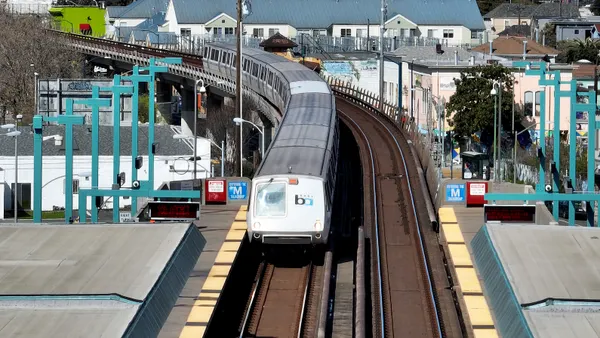Dive Brief:
- The Federal Transit Administration proposed updated guidelines to its multibillion-dollar Capital Investment Grant program that would remove the “social cost of carbon” calculation as part of the rating criteria for transit grants, calling it a “green new deal carbon scam.”
- The FTA published a request for public comment in the Federal Register Tuesday. Comments are due by Sept. 2.
- “These proposed actions remove unnecessary regulatory requirements and provide the best support possible for locally driven transit projects,” FTA Administrator Marc Molinaro said in a statement.
Dive Insight:
The Infrastructure Investment and Jobs Act provided $3 billion annually for five years through the 2026 fiscal year, along with advanced appropriations of $1.6 billion a year for CIG funds. These grants are one of the federal government’s primary programs to support investments in public transit, commuter rail, light rail, streetcars and bus rapid transit.
The proposed policy guidance change would revise the methodology for evaluating environmental benefits using vehicle miles traveled to estimate each project's effect on air quality, greenhouse gas emissions and other factors, which has been in place since 2013.
“After several years of experience with the measure, FTA has determined the VMT-based calculation adds unnecessary burden and complexity to the evaluation process,” the agency states.
The first commenter acknowledged the agency’s desire to reduce the regulatory burden on applicants, but expressed concerns about the proposed change to the methodology. “The VMT methodology allows for empirical modeling of induced travel, mode shift, and long-term sustainability impacts,” commenter Joseph Wilson said. “Eliminating it may reduce the ability to compare projects based on their environmental performance, which could undermine climate-conscious infrastructure goals.”
The FTA published an additional request for information Tuesday to solicit input from transit authorities, planning officials, states, cities, the private sector and the public on wider changes to CIG program guidance, required every two years.
The request asks responders to address three questions on how to better evaluate economic development and land use criteria related to population growth, transit-oriented development and opportunity zones. Comments must be received by Sept. 18.
For the 2026 fiscal year, the FTA is requesting $3.8 billion of the available $4.6 billion for the CIG program and the Expedited Project Delivery pilot program.













